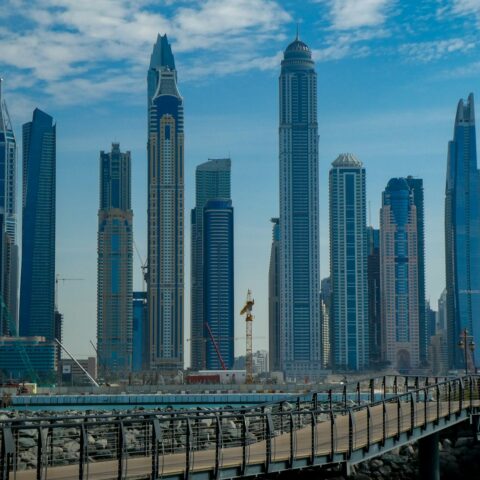Exploring The Various Holding Company Structures In The UAE: A Comprehensive Guide

The United Arab Emirates (UAE) serves as a prominent global business hub, offering both local and foreign investors a variety of corporate structures and extensive investment opportunities. Among these, Holding Companies stand out as an advantageous corporate vehicle for managing assets and subsidiaries.
Table of Contents
What is a Holding Company?
A holding company is a business structure primarily established to own and control shares or membership interests in other companies. It does not engage directly in commercial operations such as trading, manufacturing, or service delivery. Instead, it facilitates asset protection, centralizes ownership, and streamlines corporate governance. While there is no mandatory paid-up capital requirement, the benefits of limited liability depends on the chosen legal structure. This holding company model is particularly suited for managing real estate holdings, intellectual property (IP) portfolios, and subsidiary operations.
Types Of Holding Companies In The UAE
The types of holding companies in the UAE are:
Holding Companies Established in the Mainland
Holding Companies are established within the UAE mainland and these Onshore Holding Companies offer the investors centralized control and flexibility in managing their subsidiaries within the UAE.
If your business’s subsidiaries predominantly operate within the UAE onshore, a Mainland Holding Company can be ideal, enabling you to conduct commercial and administrative activities through your subsidiaries without engaging in direct trade. However, specific to the nature of the business activity and the Emirate where the Company is operated, a Mainland Holding Company is subject to corporate tax, requiring its compliance including the annual audits, filing financial statements etc.
Formation Requirements: A Mainland Holding Company can be constituted by registering with the Department of Economic Development (DED) of the relevant Emirate, and by submitting the legal documents including a Memorandum of Association and Article of Association. It can be constituted with:
- Shareholders, who can be individuals or companies, and
- A minimum capital requirement.
- Free Zone Holding Companies
Free Zone Holding companies are established within the free zones of the UAE like the Dubai International Financial Centre (DIFC), or the Abu Dhabi Global Market (ADGM), where your business can enjoy advantages like tax exemptions extending to taxation benefits , currency flexibility, profit repatriation benefits, and much more. Free zones offer a high degree of confidentiality and asset protection and enable the holding companies to own and manage shares in companies located anywhere globally.
Formation: A Holding Company in a Free Zone can be established with
- Minimum of one shareholder who can be an individual or a company, and
- One director who can be an individual or a company with minimal nationality restrictions.
Holding Companies In The DIFC
The Dubai International Financial Centre (DIFC) is a globally recognized financial hub governed by an independent legal framework based on English Common Law.
A major financial hub of Dubai, the Dubai International Financial Centre (DIFC) is a prime location for businesses to establish a holding company. Setting up a holding company in the DIFC can offer you various advantages, including:
- The Dubai International Financial Centre (DIFC) offers two prominent holding company structures: the prescribed company holding structure and the active holding company structure.
- The robust legal infrastructure and legal framework independent to the DIFC can extend effective legal protection to your business and investment.
- A DIFC holding company can hold shares and assets in both UAE-based and companies and assets anywhere else in the world.
- The strategic geographical location of the DIFC can offer your business the best network to the global markets.
- The DIFC holding companies also offer Visa Benefits, wherein its employees and their families can obtain visas, fostering a dynamic workforce.
- The DIFC provides various tax exemptions on your income and profits and also grants corporate tax incentives.
Holding Companies In The ADGM
The Abu Dhabi Global Market (ADGM) offers a business-friendly regulatory environment with flexible corporate structures. ADGM provides 100% foreign ownership with state-of-the-art infrastructure. With flexible policies on currency and employment and easy setup processes, constituting a holding company in ADGM can be an optimal decision. The Holding companies in the Abu Dhabi Global Market can be either a Special Purpose Vehicle (SPV) or Active Holding Companies.
SPV: A holding company constituted as an SPV is a passive company established solely for a specific purpose. The SPV by the ‘ADGM SPV nexus requirement’ is required to have an appropriate nexus to ADGM, the UAE or the GCC countries. For the same, the applicant must satisfy the ADGM Registration Authority that:
- The SPV will be owned or controlled by a UAE or GCC-based individual, family, or company.
- The assets held by such SPV are based in the UAE or GCC.
- The operation of the SPV can provide real or economic benefits to the UAE
To establish an SPV in the ADGM, the following documents are required:
- Application form
- KYC Documents of the shareholders
- Constitutional documents of the company in the case of a corporate shareholder
- Details of the ultimate beneficial owner
Holding companies constituted as SPVs in ADGM should have a registered office address based in ADGM, however, such entities cannot have employees. For companies seeking a cost-effective business structure, an SPV holding company can be the ideal option.
Active Holding Company: Businesses to optimise their subsidiary performance, can constitute Active Holding Companies which can offer centralized control and direct involvement over subsidiary operations, managing investments, and strategic oversight. Active Holding Companies are directly involved in the day-to-day management of their subsidiaries, offering hands-on leadership and oversight. By consolidating decision-making and resources, they enable businesses to improve operational efficiency, foster growth, and ensure alignment with the overall corporate strategy. This approach is particularly beneficial for companies looking to maintain a high level of control and influence over their various business units.
Holding Companies In The Rak ICC
The Ras Al Khaimah International Corporate Centre (RAK ICC) offers a cost-effective jurisdiction for establishing holding companies, particularly for asset protection and risk mitigation. One notable structure is the Restricted Purpose Company which is like the Special Purpose Vehicle in the Abu Dhabi Global Market ( ADGM).
The separation of ownership from personal assets in an RAK ICC holding company can aid in risk and liability reduction. These holding companies also entail reduced inheritance tax liabilities and withholding taxes.
Conclusion
Establishing a holding company in the UAE provides investors with robust asset protection, tax efficiencies, and operational flexibility. However, selecting the appropriate jurisdiction—whether mainland, DIFC, ADGM, or RAK ICC—is crucial based on your business objectives and operational needs.
Given the complexities of legal and regulatory compliance, engaging experienced legal consultants can ensure a seamless establishment process while optimizing corporate governance and asset management.
By entering the email address you agree to our Privacy Policy.



